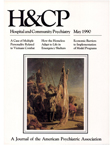Patients' and Caregivers' Adaptation to Improvement in Schizophrenia
Abstract
Treatment of poorly functioning schizophrenic patients with antidepressant medication may lead to a relatively rapid increase in their level of activity, autonomy, and assertiveness. Caregivers who had been accustomed to the patients' more blunted affect and docile behavior may perceive this change as an increase in hostility. Patients who do not know how to express anger and other strongfeelings appropriately may also find changes in their level of assertiveness to be stressful. The authors illustrate these problems with case examples and suggest that psychoeducation, regular contact with the treatment team, and training in communication can help both patients and caregivers adjust to the patient's improved condition.
Access content
To read the fulltext, please use one of the options below to sign in or purchase access.- Personal login
- Institutional Login
- Sign in via OpenAthens
- Register for access
-
Please login/register if you wish to pair your device and check access availability.
Not a subscriber?
PsychiatryOnline subscription options offer access to the DSM-5 library, books, journals, CME, and patient resources. This all-in-one virtual library provides psychiatrists and mental health professionals with key resources for diagnosis, treatment, research, and professional development.
Need more help? PsychiatryOnline Customer Service may be reached by emailing [email protected] or by calling 800-368-5777 (in the U.S.) or 703-907-7322 (outside the U.S.).



